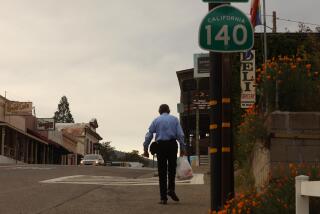Elderhostel Offers Learning, Lore, Leisure
- Share via
LAFAYETTE, La. — The “Big Easy” credits rolled, the lights came up and the class was full of questions. Was the movie based on fact? Was Jim Garrison really responsible for cleaning up Louisiana? How do you pronounce that strange name, Tchoupitoulas? Is Cajun music taught?
As in most classes, a few people asked most of the questions and the class clown made a crack or two. But there was a difference between this class and others at the University of Southwestern Louisiana: no college kids.
The 22 students had come from around the country to Lafayette for a weeklong “Elderhostel,” part of a national program for people 60 or older.
“We must continue our education,” 66-year-old Douglas Rowley said, and winked.
He and his wife, Lila, said they spent the past two winters in Texas. They came through south Louisiana on their way home last winter and wanted to see more of the area.
They looked in Elderhostel Inc.’s fat tabloid catalogue--Elderhostels are given in every state and Canadian province and numerous countries overseas -- and found the right combination of time, place and subject in Lafayette.
“We’ve known about them for three or four years, but this was the first time we were finally motivated enough to try one,” said Mrs. Rowley.
The classes were an odd gumbo of topics: Cajuns and Creoles in Louisiana films, Louisiana architecture, Mississippi River customs and geology, and the Cajun waltz and two-step.
That’s often the case in Elderhostels.
You can go, for example, to Connecticut College in New London and study psychological portraits of American presidents, Dante’s “Inferno” and country dances of old England.
Elderhostels try to schedule a variety of topics, preferably divided among science and arts and humanities, said Cynthia Trahan, administrative director for USL’s program.
There are some exceptions. The Elderhostel timed to coincide with the Festivals Acadiens focuses on Cajun food, Cajun music and dancing, and Louisiana arts and crafts. The Mardi Gras Elderhostel describes the history of Carnival and its various traditions.
Tuition at Louisiana Elderhostels ranges from $210 to $265. The classes bring instructors and the schools a little money, but not riches, Trahan said.
Many Elderhostels put their students up in dormitories, but USL uses part of the tuition to pay for rooms in a motel, shuttling students back and forth in vans.
John and Corabeth--or Jack and Bess--Fuller of Houston liked that. “I always look for two or less to a room and a private bath,” said Mrs. Fuller, 72. “I look at the subject carefully, but if you stay in cabins with six people to a room ...” She shook her head.
Fuller, 69, said he was particularly interested in the daylong tour of the Mississippi River and in the descriptions of Cajun life and culture.
They learned that Cajuns are the descendants of French Canadians whom the British kicked out of what was called Acadia in 1755.
They also learned that the movie “Belizaire the Cajun” is, as teacher Mathe Allain put it, a fairy tale; that inaccuracies in “Blaze” include having someone as handsome as Paul Newman play Gov. Earl K. Long; and that a pair of dams in central Louisiana is all that keeps the Mississippi River from changing course and leaving New Orleans on a mud flat.
As for “The Big Easy,” Allain told the class its plot wasn’t based on any particular case; Garrison was a district attorney rather than the judge he played in the movie and was known best for his investigation of John F. Kennedy’s assassination; and that there aren’t a lot of formal lessons in Cajun music.
One detail tripped her up. She spelled Tchoupitoulas Street correctly, but pronounced it “ChoopiTOOla” rather than the “ChoppuhTOOlis” heard in New Orleans.
“It does throw outsiders,” she said.
More to Read
Sign up for Essential California
The most important California stories and recommendations in your inbox every morning.
You may occasionally receive promotional content from the Los Angeles Times.











